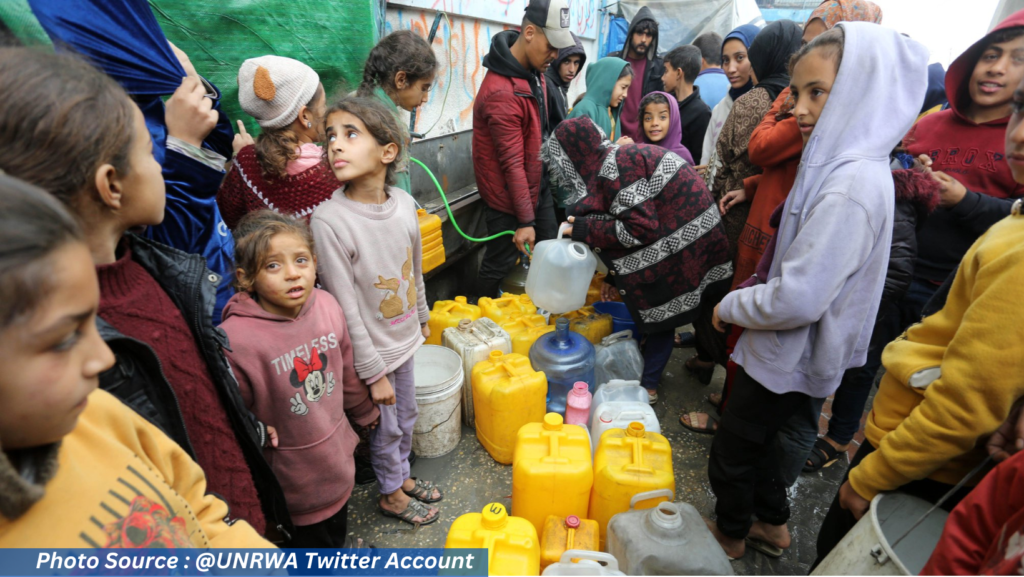New York, March 18, 2024 – Acute food insecurity is threatening groups of population in some countries but in Gaza, where the Israel-Hamas war is ongoing, famine could be imminent for more than half of the entire population 2.3 million, said a new study headed by the UN Food and Agriculture Organization (FAO).
FAO said in the new publication Integrated Food Security Phase Classification (IPC), a global partnership of 15 organizations that include governments, non-governmental organizations and UN agencies, that 1.1 million people in Gaza are projected to face catastrophic levels of food insecurity between March and July 2024, up from 378,000 in December 2023.
It said nutrition screenings conducted in February show acute malnutrition rates among children in northern Gaza and Rafah have nearly doubled since January.
UN Secretary-General António Guterres called for action to prevent famine in Gaza, saying, “Palestinians in Gaza are enduring horrifying levels of hunger and suffering.
This is the highest number of people facing catastrophic hunger ever recorded by the Integrated Food Security Classification system –anywhere, anytime.”
“This is an entirely man-made disaster — and the report (IPC) makes clear that it can be halted,” he said and called for “an immediate humanitarian ceasefire.”
“I call on the Israeli authorities to ensure complete and unfettered access for humanitarian goods throughout Gaza and for the international community to fully support our humanitarian efforts. We must act now to prevent the unthinkable, the unacceptable and the unjustifiable.”
In addition to the acute food insecurity in Gaza, IPC reported similar situations in some periods this year in Haiti, Timor Leste and Somalia.
FAO said the main goal of the IPC is to provide decision-makers with a “rigorous, evidence- and consensus-based analysis of food insecurity and acute malnutrition situations, to inform emergency responses as well as medium- and long-term policy and programming.” It the IPC was originally developed in 2004 to be used in Somalia by FAO’s Food Security and Nutrition Analysis Unit (FSNAU). “Since then, a global partnership of 15 organizations is leading the development and implementation of the IPC at global, regional and country level. With over 10 years of application, the IPC has proved to be one of the best practices in the global food security field, and a model of collaboration in over 30 countries in Latin America, Africa and Asia.”
United Nations correspondent journalists – United Nations correspondent journalists – United Nations correspondent journalists – United Nations journalism articles – United Nations journalism articles – United Nations journalism articles – United Nations News – United Nations News – United Nations News
UN warns of man-made famine in Gaza affecting more than 1.1 million people
New York, March 18, 2024 – Acute food insecurity is threatening groups of population in many countries but in Gaza, where the Israel-Hamas war is ongoing, famine could be imminent for more than half of the entire population 2.3 million, said a new study headed by the UN Food and Agriculture Organization (FAO).
FAO said in the new publication Integrated Food Security Phase Classification (IPC), a global partnership of 15 organizations that include governments, non-governmental organizations and UN agencies, that 1.1 million people in Gaza are projected to face catastrophic levels of food insecurity between March and July 2024, up from 378,000 in December 2023.
It said nutrition screenings conducted in February show acute malnutrition rates among children in northern Gaza and Rafah have nearly doubled since January.
UN Secretary-General António Guterres called for action to prevent famine in Gaza, saying, “Palestinians in Gaza are enduring horrifying levels of hunger and suffering.
This is the highest number of people facing catastrophic hunger ever recorded by the Integrated Food Security Classification system –anywhere, anytime.”
“This is an entirely man-made disaster — and the report (IPC) makes clear that it can be halted,” he said and called for “an immediate humanitarian ceasefire.”
“I call on the Israeli authorities to ensure complete and unfettered access for humanitarian goods throughout Gaza and for the international community to fully support our humanitarian efforts. We must act now to prevent the unthinkable, the unacceptable and the unjustifiable.”
In addition to the acute food insecurity in Gaza, IPC reported similar situations in some periods this year in Haiti, Timor Leste and Somalia.
FAO said the main goal of the IPC is to provide decision-makers with a “rigorous, evidence- and consensus-based analysis of food insecurity and acute malnutrition situations, to inform emergency responses as well as medium- and long-term policy and programming.” It the IPC was originally developed in 2004 to be used in Somalia by FAO’s Food Security and Nutrition Analysis Unit (FSNAU). “Since then, a global partnership of 15 organizations is leading the development and implementation of the IPC at global, regional and country level. With over 10 years of application, the IPC has proved to be one of the best practices in the global food security field, and a model of collaboration in over 30 countries in Latin America, Africa and Asia.”
United Nations correspondent journalists – United Nations correspondent journalists – United Nations correspondent journalists – United Nations journalism articles – United Nations journalism articles – United Nations journalism articles – United Nations News – United Nations News – United Nations News

